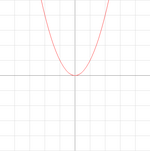Parabola
A parabola is a type of conic section. A parabola is a locus of points that are equidistant from a point (the focus) and a line (the directrix).
Contents
Parabola Equations
There are several "standard" ways to write the equation of a parabola. The first is polynomial form: ![]() where a, b, and c are constants. This is useful for manipulating the polynomial.
where a, b, and c are constants. This is useful for manipulating the polynomial.
The second is completed square form, or ![]() where a, h, and k are constants and the vertex is (h,k). This is very useful for graphing the quadratic because the vertex and stretching factor are immediately before you.
where a, h, and k are constants and the vertex is (h,k). This is very useful for graphing the quadratic because the vertex and stretching factor are immediately before you.
The third way is the conic section form, or ![]()
![]() or
or ![]() where the p is a constant, and is the distance from the focus to the vertex.
where the p is a constant, and is the distance from the focus to the vertex.
Graphing Parabolas
Using the completed square form, ![]() or
or ![]() , the vertex of the graph is at the point
, the vertex of the graph is at the point ![]() . The graph appears vertically if the
. The graph appears vertically if the ![]() term is squared, and horizontal if the
term is squared, and horizontal if the ![]() term is squared. The graph will be oriented (opens up) upwards/right if
term is squared. The graph will be oriented (opens up) upwards/right if ![]() is positive, and will be downwards/left if
is positive, and will be downwards/left if ![]() is negative.
is negative.
Problems
Introductory
- A parabola with equation
 passes through the points (2,3) and (4,3). What is
passes through the points (2,3) and (4,3). What is  ?
?
Intermediate
Olympiad
See also
This article is a stub. Help us out by expanding it.










